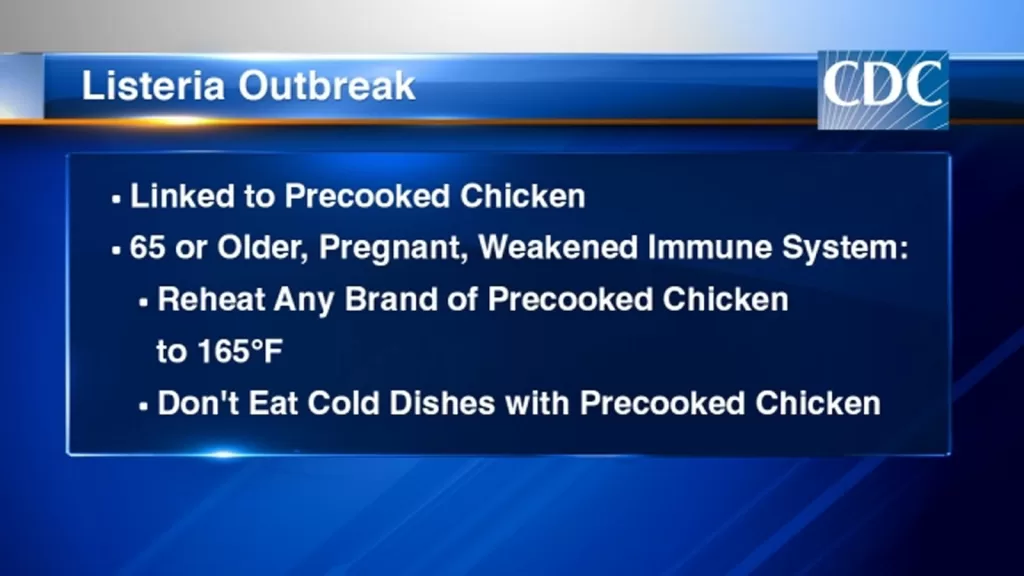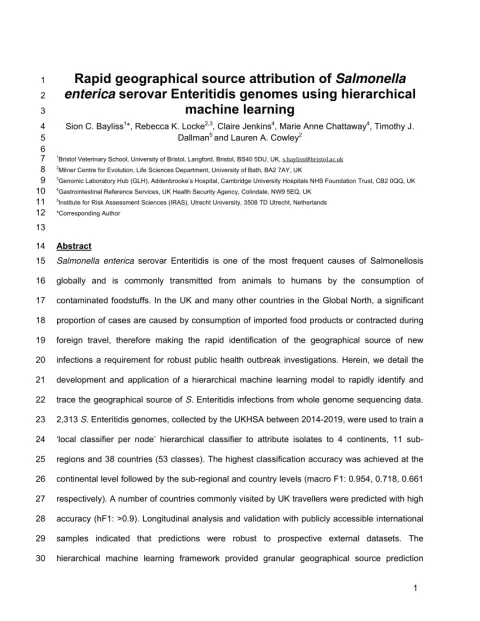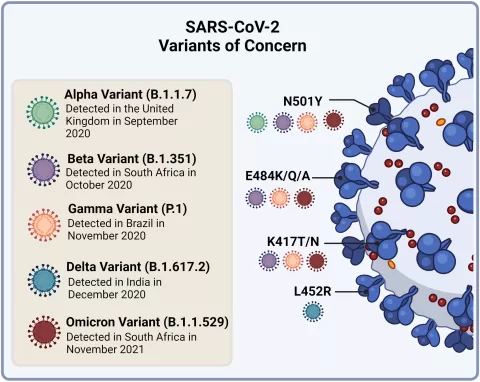The recent Listeria outbreak has raised significant concerns across the United States, with the Centers for Disease Control and Prevention (CDC) reporting a total of 19 cases, including 8 new patients, 8 hospitalizations, and 2 deaths linked to contaminated ready-to-eat meat and poultry products from Yu Shang Food. This alarming situation has prompted a large recall of 72,240 pounds of affected products manufactured before October 28, 2024. California has emerged as a hotspot, accounting for ten reported Listeria cases, while Illinois and Tennessee each recorded two instances. Among the vulnerable populations, pregnancy and Listeria infection have proven particularly hazardous, with several cases involving expectant mothers. As health officials scramble to address this urgent issue, the CDC Listeria report emphasizes the need for heightened awareness and precautionary measures amidst the ongoing risk of infection.
In light of the troubling Listeria situation, it is crucial to examine the implications of this bacterial infection on public health. Known for its association with contaminated food products, this outbreak highlights the risks associated with ready-to-eat foods, particularly those distributed by brands like Yu Shang Food. The gravity of this matter is further amplified by the reports of Listeria incidents among high-risk groups, particularly pregnant women who face increased susceptibility. As related infections continue to emerge, there is a pressing need to monitor food safety regulations and recall processes to safeguard consumers. Understanding the breadth of Listeria cases in various states is vital as we navigate the potential impacts on both individual health and food industry standards.
Understanding the CDC Listeria Report: Current Status of the Outbreak
As of last week, the Centers for Disease Control and Prevention (CDC) reported a troubling escalation in the ongoing Listeria outbreak, with 8 new cases bringing the total to 19. Among these individuals, there have been 8 additional hospitalizations, leading to a total of 17, and sadly, one more death has been recorded, culminating in 2 fatalities linked to the outbreak. This significant uptick underscores the urgent need for public awareness regarding Listeria, particularly in relation to ready-to-eat meat and poultry products originating from Yu Shang Food, a company that is now facing scrutiny following a massive recall of their products, manufactured prior to October 28, 2024. The CDC’s report highlights that this outbreak has primarily affected individuals in California, Illinois, and Tennessee, as well as several other states, indicating the widespread risk associated with these tainted food products.
The implications of the CDC’s findings go beyond the raw statistics; they encapsulate a growing public health concern as well. Since the initial cases emerged in 2021, health officials have been working tirelessly to track and contain the outbreak. Increased testing and surveillance in affected states, especially California where 10 of the cases have been reported, will be crucial in understanding the full scope of this outbreak and preventing further infections. Highlighting the importance of awareness, consumers should be informed on the signs and symptoms of Listeria infection, especially those at higher risk, including pregnant women and elderly individuals. As the investigation continues, the CDC encourages anyone who believes they may have been exposed to stay vigilant and seek medical attention if they exhibit symptoms.
Yu Shang Food Recall: Key Details and Consumer Safety
Yu Shang Food has initiated a significant recall of approximately 72,240 pounds of ready-to-eat meat and poultry products identified as hazardous following their link to the ongoing Listeria outbreak. The recall, implemented in late November, is crucial for consumer safety, particularly considering the severe health risks posed by Listeria monocytogenes. This bacterium can lead to severe illnesses, especially in vulnerable populations such as pregnant women, infants, and those with weakened immune systems. Consumers are urged to check their refrigerators and pantries for any affected products, ensuring that food safety remains a top priority during this critical time.
The recall not only highlights the dangers posed by contaminated food products but also emphasizes the responsibility of manufacturers in ensuring public health safety. As Yu Shang Food pulls its products off the market, the focus shifts towards preventing further infections. The FDA and CDC are working closely to assist in tracing and testing efforts, emphasizing transparency in the outbreak management process. Individuals must be encouraged to report any symptoms or illnesses that align with Listeria infection to their healthcare providers, ensuring timely diagnoses and interventions.
Listeria Cases in California: An Overview
California has emerged as a significant focal point in the recent Listeria outbreak, with ten cases reported among the total infections. This disproportionately high number raises concerns about the effectiveness of food safety protocols in the state, particularly for ready-to-eat products that could be easily contaminated. As health authorities investigate the sources of these infections, public awareness campaigns are vital in informing residents about the symptoms of Listeria, which often include fever, muscle aches, and gastrointestinal issues. The California Department of Public Health is working in conjunction with the CDC to monitor the situation closely and provide timely updates to the public.
Moreover, the experiences of affected individuals have brought to light the complexities surrounding the identification and reporting of Listeria cases. Many individuals recovering at home may not receive a formal diagnosis, which complicates public health efforts to track the spread of this infection comprehensively. The CDC’s assertion that the actual number of individuals affected is likely higher than reported underscores the necessity for increased testing and vigilance among healthcare providers to ensure that Listeria cases in California are accurately documented and addressed. Consumers in the area should remain aware of any recalled products and take necessary precautions to mitigate their risk of exposure.
Pregnancy and Listeria Infection: Risks and Recommendations
Pregnant women are at a significantly increased risk for Listeria infections, and alarming statistics demonstrate that seven of the 19 reported cases in this outbreak are associated with pregnancy. The CDC highlights that Listeria can lead to serious health complications for both mothers and their unborn children, including miscarriage, stillbirth, and severe illness in newborns. As healthcare providers communicate these risks to their patients, it is essential for pregnant women to practice stringent food safety measures, such as avoiding unpasteurized dairy products and carefully monitoring their consumption of ready-to-eat meats, particularly those identified in the recent recalls.
In light of the recent outbreak, healthcare professionals are urging pregnant women to stay informed about their dietary choices and the potential implications of Listeria infection. Awareness of high-risk foods and the significance of proper food handling practices can help mitigate the chance of exposure. By creating and sharing educational resources, health organizations aim to empower women with the knowledge necessary to protect themselves and their babies from the dangers of Listeria. The experiences of those affected, particularly in California where fatalities related to pregnancy and Listeria have been recorded, further reinforce the critical nature of these health messages.
Continuing Vigilance: The Battle Against Listeria
As the investigation into the Listeria outbreak continues, vigilance remains key in combating this foodborne illness. Public health officials and the CDC emphasize that the outbreak may not just be confined to the states with confirmed cases, highlighting the importance of widespread awareness and reporting of potential symptoms. The CDC’s reassurance that many individuals may not seek medical assistance raises concerns about the actual impact of this outbreak, prompting calls for enhanced surveillance and outreach within communities. Consumers should educate themselves on the signs of Listeria infection, making informed decisions about their food choices, particularly when it involves ready-to-eat products.
The potential long-term implications of this outbreak reveal the intricate relationship between food safety regulations and public health outcomes. The growing cases of Listeria infections signal an urgent need for stronger preventative measures within the food production industry. Additionally, as consumers are urged to remain cautious, accompanying actions, such as urging food manufacturers to comply with safety standards and guidelines, are essential to restore public confidence. Only through concerted efforts can we hope to reduce the number of illnesses, hospitalizations, and fatalities associated with Listeria infections in the future.
The Role of Public Health Awareness in Preventing Listeria
Public health awareness initiatives play a critical role in preventing further outbreaks of foodborne illnesses such as Listeria. The CDC’s engagement in disseminating information about the risks associated with ready-to-eat meat products shows a proactive approach to consumer education. By informing the public about high-risk foods and encouraging food safety practices, health departments can significantly mitigate risks, especially among vulnerable populations like pregnant women and infants. Educational campaigns can also empower consumers to report symptoms and seek medical attention, therefore enabling better tracking of Listeria cases.
Engaging local communities in discussions about food safety can lead to enhanced understanding and behaviors regarding food handling practices. Through collaboration with various stakeholders, including local health agencies, schools, and community organizations, vital information can reach broader audiences. As Listeria-related hospitalizations and deaths highlight the need for increased vigilance, sustained public health awareness will be integral to ensuring that consumers navigate food options safely under the current outbreak conditions and beyond.
Symptom Recognition: Key to Early Intervention for Listeria Infection
Recognizing the symptoms of Listeria infection is crucial for early intervention and treatment, particularly in vulnerable groups such as pregnant women and infants. The signs typically associated with Listeria include fever, muscle aches, gastrointestinal disturbances, and in severe cases, neurological symptoms. Individuals who experience these symptoms, especially after consuming potentially contaminated ready-to-eat meat products, should seek medical care immediately. By highlighting the importance of symptom recognition, healthcare providers can facilitate quicker diagnoses and enhance treatment outcomes, potentially reducing hospitalization rates associated with this outbreak.
Moreover, public health campaigns aimed at symptom education can complement the existing surveillance efforts by encouraging individuals to be proactive about their health. This is particularly important amid the backdrop of the current outbreak, where many affected individuals may not connect their symptoms to Listeria. By fostering an environment where patients feel empowered to communicate openly with their healthcare providers about potential exposures, we can improve the overall response to Listeria cases and clarify the pathways for effective treatment and prevention.
The Importance of Regulatory Compliance in Food Safety Practices
Regulatory compliance in food safety practices is fundamental to preventing outbreaks like the current Listeria incident linked to Yu Shang Food. Food manufacturers must adhere to stringent quality controls and safety standards to minimize contamination risks. The FDA and CDC are actively involved in monitoring food production facilities, ensuring that they meet national safety guidelines. The recent recall of over 72,000 pounds of ready-to-eat products serves as a stark reminder of the consequences of failing to meet these regulations, and the importance of maintaining vigilance at every level of food processing.
Incorporating regular audits and inspections within food production can catch potential issues before they escalate into public health emergencies. Training employees on safe food handling practices and the importance of compliance can foster a culture of safety within the industry. When consumers trust that the food they purchase is safe and backed by robust safety regulations, it can also empower them to advocate for better food safety measures. Ultimately, enhancing compliance standards is essential not just for preventing Listeria outbreaks, but for ensuring the overall safety and well-being of the public.
Community Response: Mobilizing Against Foodborne Illnesses
The community response to foodborne illnesses, particularly those caused by Listeria, plays a pivotal role in fostering public health. Local health departments and organizations can mobilize resources to educate residents on the risks associated with contaminated food products. By establishing communication channels with the CDC and other health authorities, communities can better coordinate their responses to outbreaks. Engagement through workshops, information sessions, and the dissemination of safety guidelines can empower individuals to take ownership of their health, enhancing collective resilience against foodborne pathogens.
Furthermore, community solidarity can strengthen the efforts to promote safe food practices among local businesses and consumers. By fostering partnerships with grocery stores, restaurants, and food processors, public health initiatives can facilitate greater adherence to safety protocols and encourage proactive measures in how food is handled and prepared. The collaboration between public health officials, businesses, and residents creates a united front against the growing threats posed by foodborne illnesses like Listeria, reinforcing the idea that prevention is a shared responsibility.
Frequently Asked Questions
What is the latest CDC Listeria report regarding the recent Listeria outbreak?
The latest CDC Listeria report indicates that there have been 19 cases linked to a Listeria outbreak associated with ready-to-eat meat and poultry products from Yu Shang Food. Among these cases, 8 new cases have been reported recently, resulting in a total of 17 hospitalizations and 2 deaths.
What products are included in the Yu Shang Food recall related to the Listeria outbreak?
The Yu Shang Food recall includes ready-to-eat meat and poultry products that were manufactured before October 28, 2024. The company has recalled 72,240 pounds of these products following the Listeria outbreak.
How many Listeria cases in California are linked to the outbreak?
California has reported a total of ten Listeria cases linked to the current outbreak involving Yu Shang Food products. These cases include pregnant women and their infants.
What are the risks of pregnancy and Listeria infection?
Pregnant women are at a higher risk for Listeria infection, which can lead to severe outcomes such as miscarriage, stillbirth, or severe illness in newborns. In this outbreak, seven of the affected patients were associated with pregnancy.
What should consumers know about the ready-to-eat meat recall due to the Listeria outbreak?
Consumers should be aware that all ready-to-eat meat and poultry products from Yu Shang Food manufactured before October 28, 2024, have been recalled. It is advisable to avoid consuming these products to mitigate the risk of Listeria infection.
What demographics are most affected by the Listeria outbreak?
The Listeria outbreak has predominantly affected individuals who are Asian, with 68% of cases being female. Moreover, 89% of the patients have been hospitalized, and a significant number of cases have involved pregnant women and infants.
How can individuals report potential cases of Listeria infection related to the outbreak?
Individuals who suspect they have contracted Listeria infection related to the outbreak should seek medical attention and report their cases to local health departments. It’s important to mention any recent consumption of ready-to-eat meats associated with the Yu Shang Food recall.
What is the significance of the Listeria outbreak’s initial illnesses traced back to 2021?
The initial illnesses connected to the Listeria outbreak date back to 2021, highlighting the potential for delayed identification and reporting of such outbreaks. This suggests that the actual number of affected individuals could be higher than reported, as many may recover without medical assistance.
| Category | Details |
|---|---|
| Reported Cases | 19 total, 8 new cases reported last week |
| Hospitalizations | 17 total, 8 new hospitalizations reported last week |
| Deaths | 2 total, 1 additional death reported last week |
| Products Recalled | 72,240 pounds of ready-to-eat meat and poultry products |
| Manufacturer | Yu Shang Food, Inc., Spartanburg, SC |
| States Affected | California, Illinois, Tennessee, Oregon, Nevada, Georgia, New York |
| Pregnancy Cases | 7 cases associated with pregnancy |
| Demographics | All 19 patients are Asian, with 68% being female |
| Warning from CDC | The true number of affected individuals is likely higher than reported. |
Summary
The recent Listeria outbreak has raised significant health concerns, highlighting the importance of food safety. This outbreak, linked to ready-to-eat meat and poultry products from Yu Shang Food, has resulted in numerous cases of illness, hospitalizations, and even fatalities. Pregnant women and infants are particularly vulnerable, underscoring the need for immediate action and awareness. With the CDC urging vigilance, it is crucial for consumers to stay informed about product recalls and food safety practices to prevent further cases of Listeria infection.
The content provided on this blog (e.g., symptom descriptions, health tips, or general advice) is for informational purposes only and is not a substitute for professional medical advice, diagnosis, or treatment. Always seek the guidance of your physician or other qualified healthcare provider with any questions you may have regarding a medical condition. Never disregard professional medical advice or delay seeking it because of something you have read on this website. If you believe you may have a medical emergency, call your doctor or emergency services immediately. Reliance on any information provided by this blog is solely at your own risk.








